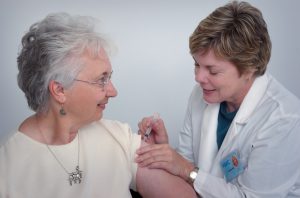Seniors Should Get Vaccinated
You've got nothing to lose and everything to gain.
 Some things that are healthy are also pesky. A staircase for instance. It’s less convenient than taking an elevator — but it’s far better for your cardiovascular system. Or a salad. Not always as satisfying as a hamburger, but much richer in nutrition.
Some things that are healthy are also pesky. A staircase for instance. It’s less convenient than taking an elevator — but it’s far better for your cardiovascular system. Or a salad. Not always as satisfying as a hamburger, but much richer in nutrition.
Vaccines can also be pesky, not to mention prickly. But they are essential for your health.
When you’re born in the United States, during the first few years of your life, you receive many childhood vaccines to build additional immunity. That’s why we’ve largely eradicated diseases such as measles, mumps, smallpox and more in the U.S.
I say “largely” because not all of these diseases are completely eliminated from our communities. And that’s also why it’s important for you to stay up to date with vaccinations that can protect you and your loved ones.
Covid-19 Vaccine and Boosters
Stay protected. Getting vaccinated and boosted against Covid-19 is the best defense against this virus. It will also help protect others around you from getting the virus, including people who are more likely to get very sick or die from Covid-19. Second boosters are now strongly recommended for all persons 50 and above.
Worth knowing: Getting vaccinated and boosted with this safe, highly effective vaccine can reduce your risk of getting Covid-19 and prevent you from getting severe or life-threatening symptoms even if you do get this virus.
When to get it: As soon as possible.
Flu Vaccine
Get it even if you are healthy. Plus, it’s free! Even if you’re in tip-top shape in your senior years, you should still get the flu vaccine each year. Since age is an independent risk factor for severe consequences from the flu, you’re more vulnerable than a 20-something couch potato.
Seniors are at a higher risk of developing serious complications from the fly, such as pneumonia. The flu virus kills about 12,000 Americans 65 and older each year, according to the Centers for Disease Control and Prevention, and it hospitalizes many more.
Worth knowing: Know that you can’t get the flu from the flu vaccine. Let me be even clearer: it is impossible to get the flu from the flu vaccine. Like most vaccines, the flu vaccine contains a dead organism to trigger your immune system. It is not a live virus or live bacteria. The vaccine is updated each year to account for changes in the actual virus.
The best part? Medicare charges nothing for the flu shot.
When to get it: Every year. It can be the difference between life and death.
Pneumococcal (Pneumonia) Vaccine
Keep serious illnesses at bay. Older people have a higher risk of getting pneumonia and are more likely to die from it if they do. The disease can trigger bloodstream infections, sepsis and other health issues that are far worse than a pesky vaccine.
Worth knowing: The pneumococcal vaccine will significantly reduce your risk of catching pneumonia or falling seriously ill from it.
When to get it: At age 65, even if you’re completely healthy. Earlier, if you’ve had certain medical problems that would increase your risk.
Tetanus, Diphtheria and Pertussis (Tdap) Vaccine
Get it for your grandchildren. I care for seniors who understandably question the need to get the Tdap booster vaccine every 10 years, as the chances are rare of contracting tetanus, diphtheria or pertussis (whooping cough) as an adult.
Let’s consider the upside and downside risks. As people age, their immunity wanes, so seniors will have less immunity than middle-aged adults. If you get these vaccines, the downside is the slight, brief pain in your shoulder muscle.
Here’s the upside: you avoid the dire consequences of each disease.
- Tetanus, which enters the body through cuts in the skin, is a terrible, life-threatening illness that forcibly tightens your entire body to the point where you can’t breathe.
- Diphtheria causes significant throat swelling and also can be life-threatening. What’s worse, it spreads form person to person.
- Whooping cough may not kill you, but it spreads easily from person to person. Recent outbreaks have been reported throughout the U.S. Although whooping cough is typically a mild disease for seniors, the disease causes vicious symptoms in babies and children, resulting in violent and rapid coughing, and accompanied by a disturbing “whooping” sound.
Worth knowing: When seniors get the Tdap vaccine, they protect themselves and their grandchildren from these terrible diseases.
When to get it: Every 10 years.
Shingles
Avoid this painful illness. An infection that’s more common than tetanus and diphtheria is shingles. Caused by varicella zoster (the same virus as chicken pox), shingles wreaks havoc on the nerves and includes symptoms such as tingling, itching and burning pain. It also triggers a rash of fluid-filled blisters on your skin, and pain can remain even after the rash disappears.
Worth knowing: You should get this vaccine, even if you’ve had chicken pox.
When to get it: Adults ages 50 and older should get vaccinated against shingles in a two-dose course.
Keep Up With Your Vaccinations
Talk with your primary care provider to be sure you’re up to date on your vaccines. Together, you can be sure you’re protected against preventable illnesses and the serious health consequences they can cause.
As a primary care provider myself, I recognize that shots can feel a bit inconvenient and pesky, but vaccines also unlock the freedom to live a healthy, active life.
 Raymond Carter, MD, is board certified in both Internal Medicine and Pediatrics and is a member of the American College of Physicians and the American Academy of Pediatrics. He’s made presentations concerning healthcare costs, quality and safety systems, childhood and adult vaccinations, and advanced transition care concepts. Dr. Carter is a clinical leader of the primary care practice at ChristianaCare’s Concord Health Center in Chadds Ford, where he sees patients of all ages. ChristianaCare.org.
Raymond Carter, MD, is board certified in both Internal Medicine and Pediatrics and is a member of the American College of Physicians and the American Academy of Pediatrics. He’s made presentations concerning healthcare costs, quality and safety systems, childhood and adult vaccinations, and advanced transition care concepts. Dr. Carter is a clinical leader of the primary care practice at ChristianaCare’s Concord Health Center in Chadds Ford, where he sees patients of all ages. ChristianaCare.org.
